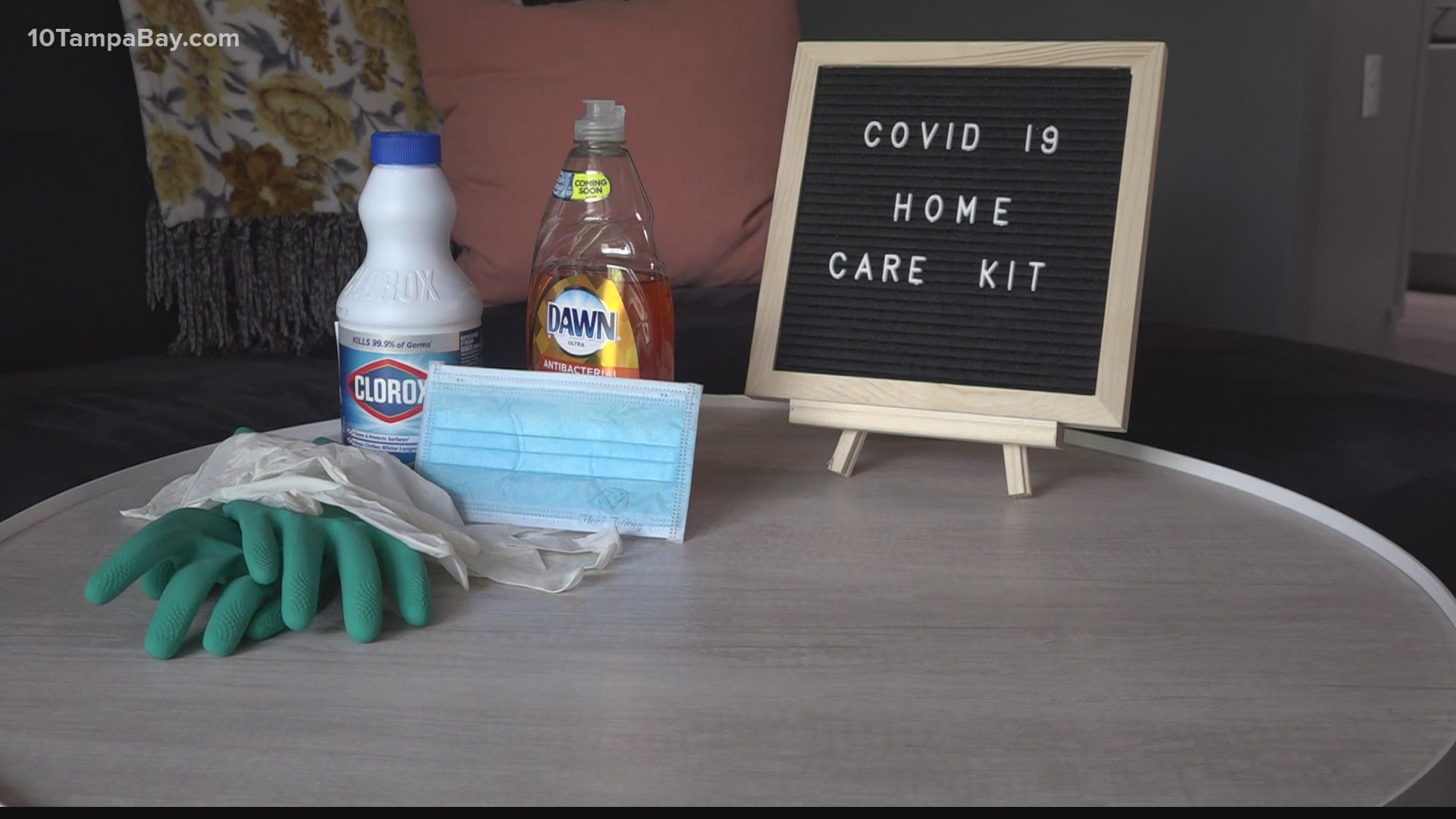TAMPA, Fla. — We're nearing the two-week mark from Thanksgiving when millions of Americans decided to travel despite warnings from the Centers for Disease Control.
People can show symptoms anywhere from about four to 14 days after exposure to COVID-19, so some may start feeling sick this week after exposure during their travel and gatherings.
Most people who show symptoms of COVID-19 won't need to go to the hospital.
"About 80 percent of all people infected with the coronavirus can be treated at home. Of those who don't about 10 percent will get better in a hospital and another five percent will have severe symptoms," said Dr. Nishant Anand, the Executive Vice President and Chief Medical Officer at BayCare.
A vaccine is on the way to Tampa Bay area hospitals, but a wide rollout is not expected until next year. In the meantime, the virus is still spreading and infecting thousands of people daily.
So, what should you have at home in case someone is sick with COVID-19?
Here are some tips and supplies you'll need:
The best-case scenario is giving the sick person their own room. No one else should enter that room, even pets. If possible, give them their own bathroom to use as well. If that isn't possible, make sure the person is wearing a mask when they leave the bedroom and disinfect the bathroom before anyone else uses it.
"The person who is sick should get their own set of towels, bed linens and dishes," said Dr. Anand. This will reduce the risk of spreading the virus to someone else in the home. Their laundry and dishes should be done separately from others and with the warmest water possible.
It's a good idea to make sure you have an "at-home care kit" put together, just in case. You'll need safety and cleaning supplies, different medicine and healthy food and drinks.
What kinds of supplies do I need?
Make sure you have disinfectants, like Clorox, Lysol or bleach. The CDC has a recommended list of disinfectants and how they should be used in your home. You'll want plastic gloves, either dish gloves or plastic disposable gloves will work. You'll wear those when handling dirty laundry or dishes and when using disinfectants. Make sure you have soap and laundry detergent.
Face masks are also recommended, either medical grade or something handmade.
"When you're infected, you should wear a mask around your loved ones as much as possible. If you can't, they should wear one to protect themselves," said Dr. Anand.
What kind of medications should I have?
"With COVID-19, you treat the symptoms they may have. So if they have a fever, they can take Tylenol. If they have a cough, you can take cough medicine, any over the counter medications," said Dr. Anand.
You'll want cough syrup, cough drops, Tylenol or acetaminophen and a thermometer to monitor fever. Consider adding a multivitamin or vitamin C supplement to the daily dosage of medication.
RELATED: Q&A: How do the COVID-19 vaccines work? Are they like the flu vaccine, will there be side effects?
What kinds of things should a sick person be eating or drinking?
"I always joke and say I love chicken noodle soup, so that's actually something you can't go wrong with. Eat and drink so you stay hydrated. The worst thing you can do is stop eating and lose a bunch of weight so your body gets even weaker," said Dr. Anand. You'll want lots of liquids. Think water, tea, juice and electrolyte replacement drinks but be conscious of sugar. Healthy fruits, like fresh apples, oranges, bananas and lemons are good to have. Honey in hot water or tea and warm soup can help as decongestants and provide some nourishment,
Make sure to include enough lean, healthy proteins as well.
When is the right time to seek professional medical attention?
Look for these four symptoms as a sign to go to the hospital:
- Shortness of breath
- Chest pains
- Confusion and lethargy
- Blue lips
How long is a person sick with COVID-19?
Symptoms can last anywhere from four to 14 days, sometimes longer. Many people are reporting long-lasting symptoms and health effects such as shortness of breath, continued loss of taste and smell, fatigue, heart palpitations and a growing list of other ailments.
When do I know if someone is better?
"When you're fever-free for about three days or 72 hours. That means a continuous 72 hours with no fever and your shortness of breath and cough are better," said Dr. Anand. He suggests still taking precautions to keep others from getting sick though. Avoid contact with elderly or more at-risk people and wear a mask around your family members for a few days before fully re-integrating back into your regular home life.
For more information about COVID-19, you can access the CDC's information here.
- Tampa boil water notice runs through Thursday; city hands out free bottled water
- Cooking, drinking and showering: What can you do under Tampa's boil water notice?
- Home of fired Florida coronavirus data worker raided by law enforcement
- DeSantis appointee quits over raid on former state COVID-19 data worker's home
- FHP: Motorcyclist jailed for leaving crash that left 7-year-old dead
- Here's where to see Christmas lights around Tampa Bay
►Breaking news and weather alerts: Get the free 10 Tampa Bay app
►Stay In the Know! Sign up now for the Brightside Blend Newsletter

